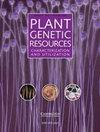Phenotypic characterization of sesame (Sesamum indicum L.) revealed promising genotypes for moisture stress conditions
IF 0.7
4区 生物学
Q3 PLANT SCIENCES
Plant Genetic Resources: Characterization and Utilization
Pub Date : 2023-09-06
DOI:10.1017/s1479262123000667
引用次数: 0
Abstract
Soil moisture deficit is the major constraint for sesame crop production during its main rainfed and summer cultivation seasons. In summer cultivation, the crop frequently gets exposed to soil moisture deficit at various crop growth stages. Therefore, it is essential to identify the traits along with promising genotypes adapted to soil moisture deficit. A set of 35 sesame genotypes with checks was used to quantify the variation in morpho-physiological, yield, and quality traits under irrigated (WW) and deficit soil moisture stress (WS) conditions in the summer seasons of 2021 and 2022. The analysis of variance revealed the presence of high variability among the genotypes for various measured traits. The mean performance indicated that WS negatively affects the growth, development, yield and quality traits. Moreover, the correlation, path analysis and D2 analysis studies suggested that the traits, viz. leaf area (LA), total dry matter (TDM), canopy temperature (CT), number of branches per plant (NBP) and number of seeds per capsule (NSC) were significantly associated with seed yield under both the conditions. Quality traits like palmitic acid and oleic acid correlated positively with seed yield, particularly under WS. Furthermore, the genotypes with lower canopy temperatures were found to be better seed yielders under WS. In addition, mean performance and cluster analysis suggested that the genotypes: IC- 205776, JSCDT-112, JCSDT-26, IC-205610, and IC-204300, secured higher seed yield along with superior agronomical traits and net photosynthetic rate. These selected genotypes were most promising and could be used in future sesame crop improvement programmes.芝麻(Sesamum indicum L.)的表型特征揭示了水分胁迫条件下有前景的基因型
土壤水分亏缺是制约芝麻作物在旱作季和夏耕季生产的主要因素。在夏季栽培中,作物在生长的各个阶段经常遭受土壤水分亏缺。因此,有必要确定适应土壤水分亏缺的性状和有前景的基因型。以35个芝麻基因型为研究对象,定量分析了2021年和2022年夏季灌溉(WW)和亏缺土壤水分胁迫(WS)条件下芝麻形态生理、产量和品质性状的变化。方差分析表明,各被测性状的基因型之间存在较高的变异性。平均表现表明,WS对水稻生长发育、产量和品质性状均有负面影响。相关分析、通径分析和D2分析表明,两种处理条件下,叶片面积(LA)、总干物质(TDM)、冠层温度(CT)、单株分枝数(NBP)和每蒴果种子数(NSC)等性状与种子产量均显著相关。棕榈酸和油酸等品质性状与种子产量呈正相关,特别是在WS下。此外,在WS条件下,冠层温度较低的基因型种子产量较好。平均性能和聚类分析表明,IC- 205776、JSCDT-112、JCSDT-26、IC-205610和IC-204300基因型籽粒产量较高,农艺性状和净光合速率均较优。这些选择的基因型是最有希望的,可以用于未来的芝麻作物改良计划。
本文章由计算机程序翻译,如有差异,请以英文原文为准。
求助全文
约1分钟内获得全文
求助全文
来源期刊

Plant Genetic Resources: Characterization and Utilization
Agricultural and Biological Sciences-Agronomy and Crop Science
CiteScore
2.80
自引率
0.00%
发文量
29
审稿时长
>12 weeks
期刊介绍:
Plant Genetic Resources is an international journal which provides a forum for describing the application of novel genomic technologies, as well as their integration with established techniques, towards the understanding of the genetic variation captured in both in situ and ex situ collections of crop and non-crop plants; and for the airing of wider issues relevant to plant germplasm conservation and utilisation. We particularly welcome multi-disciplinary approaches that incorporate both a technical and a socio-economic focus. Technical aspects can cover developments in technologies of potential or demonstrated relevance to the analysis of variation and diversity at the phenotypic and genotypic levels.
 求助内容:
求助内容: 应助结果提醒方式:
应助结果提醒方式:


